This is the fourth and final book in the Windsingers quartet (after Harpy's Flight, The Windsingers and The Limbreth Gate).
In this volume, Ki and Vandien, having trouble finding employment in the South, accept an unusual cargo: they must bring Gotheris, the teenage son of a local villager, to his uncle in the city of Villena where he is to become a healer.
What should have aroused their suspicions was that everyone seemed happy to get rid of "Goat". He'll turn out a strange and tortured boy indeed. That combined with all the rest (the despotic local Duke's Brurjan patrols, the rebellion, the runaway girl Willow) will turn what seemed like an easy stroll into quite an adventure. The money was just too good to be true!
I found the first half of Luck of the Wheel rather slow, with just the team plodding through the countryside and Goat and Willow being difficult, and I was wondering where the story would be going to. Eventually, the pace picked up and the last third proved genuinely gripping. I now realize I grew quite fond of Ki and Vandien and I'm pretty sad to leave them behind.
A slow start but a gripping ending.
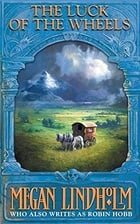 Posted : 14 years, 8 months ago on 8 October 2010 08:54
(A review of Luck of the Wheels)
Posted : 14 years, 8 months ago on 8 October 2010 08:54
(A review of Luck of the Wheels) 0 comments, Reply to this entry
0 comments, Reply to this entry
Missing that little something.
 Posted : 14 years, 9 months ago on 25 August 2010 08:19
(A review of The Limbreth Gate (The Ki & Vandien Quartet))
Posted : 14 years, 9 months ago on 25 August 2010 08:19
(A review of The Limbreth Gate (The Ki & Vandien Quartet))This is the third volume in the Windsingers quartet (after Harpy's Flight, The Windsingers and before Luck of the Wheels).
The book begins with Ki and Vandien in the city of Jojorum with a new wagon, supposed to meet after getting supplies.
But Vandien is kidnapped, and Ki tricked into crossing through the Limbreth Gate, believing she's following Vandien who didn't wait for her. She finds herself in a strange world of perpetual dusk.
The book goes on to tell the story from both sides of the gate: Vandien helps Chess and Jace, a young boy and his mother from the Limbreth world, survive in the hostile heat and burning light of Jojorum, and searches for a way to trick the gate keeper, to chase after his partner and save her. Ki for her part still thinks she's following Vandien, but is slowly poisoned by the world's water and charmed by the glowing light of the Limbreth.
I found this volume diverting but not as gripping as the previous one. The Limbreth world was intriguing but rather direful and disquieting, Chess and Jace presaged of an interesting story but turned out a tad too obtuse and narrow-minded. Although Megan Lindholm's writing style is still extremely pleasing, as a whole I found that all the plot lines missed that little something...
The book begins with Ki and Vandien in the city of Jojorum with a new wagon, supposed to meet after getting supplies.
But Vandien is kidnapped, and Ki tricked into crossing through the Limbreth Gate, believing she's following Vandien who didn't wait for her. She finds herself in a strange world of perpetual dusk.
The book goes on to tell the story from both sides of the gate: Vandien helps Chess and Jace, a young boy and his mother from the Limbreth world, survive in the hostile heat and burning light of Jojorum, and searches for a way to trick the gate keeper, to chase after his partner and save her. Ki for her part still thinks she's following Vandien, but is slowly poisoned by the world's water and charmed by the glowing light of the Limbreth.
I found this volume diverting but not as gripping as the previous one. The Limbreth world was intriguing but rather direful and disquieting, Chess and Jace presaged of an interesting story but turned out a tad too obtuse and narrow-minded. Although Megan Lindholm's writing style is still extremely pleasing, as a whole I found that all the plot lines missed that little something...
 0 comments, Reply to this entry
0 comments, Reply to this entry
This time I'll side with Vandien.
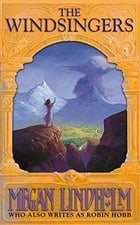 Posted : 14 years, 10 months ago on 28 July 2010 06:59
(A review of The Windsingers)
Posted : 14 years, 10 months ago on 28 July 2010 06:59
(A review of The Windsingers)This is the second volume of the Windsingers tetralogy (after Harpy's Flight and before The Limbreth Gate and Luck of the Wheels).
Several months have passed since the events of Harpy's Flight, and after spending some time travelling together and getting closer, Ki and Vandien are now searching for work. They'll both be hired by different people and the book with alternatively follow their separate stories, until their final reunion.
Ki has to haul crates from Dyal to Bitters, a nearby village, but what seems at first like easy task will turn out delicate and fraught with danger. Indeed, the terms of the contract specify that the boxes must be delivered whole, and their content is extremely precious, not to mention coveted by the Windsingers, a powerful cult of women who can control the weather.
For his part, Vandien has accepted a challenge in exchange for the lifting of the disfiguring scar that divides his face since his fight with a Harpy. He has to go to False Harbor during Temple Ebb festival, when the tide is lowest, and recover a legendary chest in the Windsingers' sunken temple. Does the chest really exist, or is Srolan's promise of healing only a false hope?
I enjoyed Vandien's side of the story more than Ki's. I found the fisherfolk in False Harbor, especially Janie the village's mobbing target whose grandfather has supposedly seen the chest, much more intriguing than the Windsingers and the strange wizard Dresh, and Vandien's struggle more gripping.
Several months have passed since the events of Harpy's Flight, and after spending some time travelling together and getting closer, Ki and Vandien are now searching for work. They'll both be hired by different people and the book with alternatively follow their separate stories, until their final reunion.
Ki has to haul crates from Dyal to Bitters, a nearby village, but what seems at first like easy task will turn out delicate and fraught with danger. Indeed, the terms of the contract specify that the boxes must be delivered whole, and their content is extremely precious, not to mention coveted by the Windsingers, a powerful cult of women who can control the weather.
For his part, Vandien has accepted a challenge in exchange for the lifting of the disfiguring scar that divides his face since his fight with a Harpy. He has to go to False Harbor during Temple Ebb festival, when the tide is lowest, and recover a legendary chest in the Windsingers' sunken temple. Does the chest really exist, or is Srolan's promise of healing only a false hope?
I enjoyed Vandien's side of the story more than Ki's. I found the fisherfolk in False Harbor, especially Janie the village's mobbing target whose grandfather has supposedly seen the chest, much more intriguing than the Windsingers and the strange wizard Dresh, and Vandien's struggle more gripping.
 0 comments, Reply to this entry
0 comments, Reply to this entry
Great talent already.
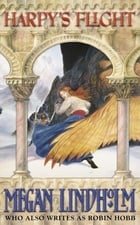 Posted : 15 years ago on 11 May 2010 08:07
(A review of Harpy's Flight)
Posted : 15 years ago on 11 May 2010 08:07
(A review of Harpy's Flight)This is the first volume of the Windsingers tetralogy (before The Windsingers, The Limbreth Gate and Luck of the Wheels).
Ki is an outcast Romni young woman travelling with her wagon and Sigmund and Sigurd, two grays horses, as sole possession, and set on crossing the ice-clad Sisters' mountain pass and delivering her freight.
On the way she almost kills Vandien in self-defense when the hungry and shabby-looking man tries to steal one of her horses to cross the pass. Instead they decide to ride together, although Vandien will try several times to talk her out of taking this road with her wagon.
The narrative alternates between the present, with the tale of Ki and Vandien's growing friendship as they face dire perils together, and the past, when Ki reminisces about the events that lead her here. In these episodes, the reader discovers her story: the violent death of her husband and two children, murdered by Harpies, her hunger for revenge and attack on a Harpies' nest, her time with her husband's family, trying to respect their customs and rites and finally leaving, her cousin-in-law Haftor urging her to take the Sisters' Pass.
Harpy's Flight is Megan Lindholm's first novel, written in 1982, and although I didn't find it as thrilling as her later trilogies written as Robin Hobb, I was delighted to discover she already had that amazing style and writing talent.
Ki is an outcast Romni young woman travelling with her wagon and Sigmund and Sigurd, two grays horses, as sole possession, and set on crossing the ice-clad Sisters' mountain pass and delivering her freight.
On the way she almost kills Vandien in self-defense when the hungry and shabby-looking man tries to steal one of her horses to cross the pass. Instead they decide to ride together, although Vandien will try several times to talk her out of taking this road with her wagon.
The narrative alternates between the present, with the tale of Ki and Vandien's growing friendship as they face dire perils together, and the past, when Ki reminisces about the events that lead her here. In these episodes, the reader discovers her story: the violent death of her husband and two children, murdered by Harpies, her hunger for revenge and attack on a Harpies' nest, her time with her husband's family, trying to respect their customs and rites and finally leaving, her cousin-in-law Haftor urging her to take the Sisters' Pass.
Harpy's Flight is Megan Lindholm's first novel, written in 1982, and although I didn't find it as thrilling as her later trilogies written as Robin Hobb, I was delighted to discover she already had that amazing style and writing talent.
 0 comments, Reply to this entry
0 comments, Reply to this entry
Reminiscent of Tiffany Aching.
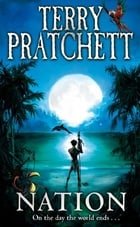 Posted : 15 years, 2 months ago on 5 April 2010 12:13
(A review of Nation)
Posted : 15 years, 2 months ago on 5 April 2010 12:13
(A review of Nation)Coming back in his canoe from the Boys' Island, ready for his coming-of-age ritual, young Mau is hit by a huge wave. Stunned and a little disoriented, he finally arrives, only to find his home devastated, his family and friends dead.
There's also a long trench in the forest and at the end of it, the wreck of the Sweet Judy and a strange girl who tries to shoot him. But soon this little misunderstanding is over, and they start communicating.
Together they'll help the refugees arriving from nearby islands and start rebuilding a civilization, explore the lagoon and the Grandfathers' Cave and find ancient statues and hidden treasures, defend their Nation against the Raiders.
Even though Nation is not as witty and funny as the usual Pratchett novel, I really enjoyed seeing Mau and Daphne's relationship become deeper, and found their discovery expeditions very exciting. Daphne reminded me much of Terry Pratchett's other teenage heroin, Tiffany Aching. The novel itself is also full of philosophy in disguise, which makes it instructing to boot, although it contained slightly too much religion to my liking.
There's also a long trench in the forest and at the end of it, the wreck of the Sweet Judy and a strange girl who tries to shoot him. But soon this little misunderstanding is over, and they start communicating.
Together they'll help the refugees arriving from nearby islands and start rebuilding a civilization, explore the lagoon and the Grandfathers' Cave and find ancient statues and hidden treasures, defend their Nation against the Raiders.
Even though Nation is not as witty and funny as the usual Pratchett novel, I really enjoyed seeing Mau and Daphne's relationship become deeper, and found their discovery expeditions very exciting. Daphne reminded me much of Terry Pratchett's other teenage heroin, Tiffany Aching. The novel itself is also full of philosophy in disguise, which makes it instructing to boot, although it contained slightly too much religion to my liking.
 0 comments, Reply to this entry
0 comments, Reply to this entry
The Drakhaoul menace...
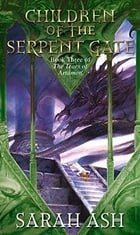 Posted : 15 years, 2 months ago on 19 March 2010 10:21
(A review of Children Of The Serpent Gate (THE TEARS OF ARTAMON:))
Posted : 15 years, 2 months ago on 19 March 2010 10:21
(A review of Children Of The Serpent Gate (THE TEARS OF ARTAMON:))This is the third and final volume of the Tears of Artamon (after Lord of Snow and Shadows and Prisoner of the Ironsea Tower).
After being set free by Eugene on Ty Nagar, new daemons are now looking for their hosts among the descendants of Artamon. Their aim is to open the Serpent Gate with the sacrifice of innocent children, to let their lord Nagazdiel invade the World. Realizing everything is getting out of his hands, Eugene has no choice but to ask Gavril for help: their Drakhaouls must unite against their brothers' dire intentions.
At the same time, pious Enguerrand of Francia has stolen the rubies and is claiming now the throne of New Rossiya. He and his Guerriers have launched an inquisition against all forms of magic, and are raiding Smarna and Tielen in search of heretics, to burn them at the stake.
And so Kaspar Linnaius is captured. But Kiukiu needs the Magus's skills to restore her. Indeed, she has stayed too long in the Ways Beyond trying to help the wraith-children and has lost almost all her life force. She is now as frail and fragile as an old woman and will die soon, and mostly she doesn't want Gavril to see her like that.
Meanwhile Astasia, who has fled to Francia with her brother Andrei, is starting to regret her move.
Again, I missed the immersion I experienced in the first volume. There are many characters and twice as many plot lines, some of which are left dangling at the end of the series (if the character has not been killed yet), and the perpetual chase goes on. However, I very much enjoyed seeing Gavril and Khezef's relationship deepen, and witnessing Eugene's evolution over time, surprisingly becoming more human with the daemon in him.
After being set free by Eugene on Ty Nagar, new daemons are now looking for their hosts among the descendants of Artamon. Their aim is to open the Serpent Gate with the sacrifice of innocent children, to let their lord Nagazdiel invade the World. Realizing everything is getting out of his hands, Eugene has no choice but to ask Gavril for help: their Drakhaouls must unite against their brothers' dire intentions.
At the same time, pious Enguerrand of Francia has stolen the rubies and is claiming now the throne of New Rossiya. He and his Guerriers have launched an inquisition against all forms of magic, and are raiding Smarna and Tielen in search of heretics, to burn them at the stake.
And so Kaspar Linnaius is captured. But Kiukiu needs the Magus's skills to restore her. Indeed, she has stayed too long in the Ways Beyond trying to help the wraith-children and has lost almost all her life force. She is now as frail and fragile as an old woman and will die soon, and mostly she doesn't want Gavril to see her like that.
Meanwhile Astasia, who has fled to Francia with her brother Andrei, is starting to regret her move.
Again, I missed the immersion I experienced in the first volume. There are many characters and twice as many plot lines, some of which are left dangling at the end of the series (if the character has not been killed yet), and the perpetual chase goes on. However, I very much enjoyed seeing Gavril and Khezef's relationship deepen, and witnessing Eugene's evolution over time, surprisingly becoming more human with the daemon in him.
 0 comments, Reply to this entry
0 comments, Reply to this entry
A perpetual chase.
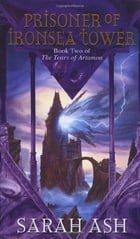 Posted : 15 years, 4 months ago on 7 February 2010 11:50
(A review of Prisoner Of Ironsea Tower (THE TEARS OF ARTAMON:))
Posted : 15 years, 4 months ago on 7 February 2010 11:50
(A review of Prisoner Of Ironsea Tower (THE TEARS OF ARTAMON:))This is the second volume of the Tears of Artamon (after Lord of Snow and Shadows and before Children of the Serpent Gate).
After the terrible battle in Azhkendir, Eugene is disfigured but alive, and asks Astasia to marry him. Seeing her Duchy going to pieces and fearing for her parents' sanity, she has little choice but to comply. The empire of New Rossiya is created.
Knowing that Gavril has cast out the dragon and is no longer a threat, Eugene takes the opportunity to seek revenge on the man who maimed him. Gavril is condemned and imprisoned in the Ironsea Tower, an asylum for the insane on the jagged and desolate cliffs of Arnskammar. How long can he resist calling the Drakhaoul to his rescue?
In the meantime, Gavril's mother Elysia travels back to her home in Smarna and kindles the flames of rebellion, while Kiukiu is sweet-talked by Kaspar Linnaius into helping Eugene find the way to Ty Nagar, where the Drakhaons are waiting for their release. The vicious Magus will leave her lost in the Ways Beyond.
In opposition to the first volume where I felt trapped with the heroes and struggling with them, in this book I was rather watching from afar. For me this middle-volume can be summarized as a perpetual chase, with characters repeatedly looking for others where they're not, and relatively few relevant events happening in the end. I did enjoy the court intrigue between Empress Astasia and the Francian singer Celestine, though, and hope the third part will grip me as much as the first one did.
After the terrible battle in Azhkendir, Eugene is disfigured but alive, and asks Astasia to marry him. Seeing her Duchy going to pieces and fearing for her parents' sanity, she has little choice but to comply. The empire of New Rossiya is created.
Knowing that Gavril has cast out the dragon and is no longer a threat, Eugene takes the opportunity to seek revenge on the man who maimed him. Gavril is condemned and imprisoned in the Ironsea Tower, an asylum for the insane on the jagged and desolate cliffs of Arnskammar. How long can he resist calling the Drakhaoul to his rescue?
In the meantime, Gavril's mother Elysia travels back to her home in Smarna and kindles the flames of rebellion, while Kiukiu is sweet-talked by Kaspar Linnaius into helping Eugene find the way to Ty Nagar, where the Drakhaons are waiting for their release. The vicious Magus will leave her lost in the Ways Beyond.
In opposition to the first volume where I felt trapped with the heroes and struggling with them, in this book I was rather watching from afar. For me this middle-volume can be summarized as a perpetual chase, with characters repeatedly looking for others where they're not, and relatively few relevant events happening in the end. I did enjoy the court intrigue between Empress Astasia and the Francian singer Celestine, though, and hope the third part will grip me as much as the first one did.
 0 comments, Reply to this entry
0 comments, Reply to this entry
Cold and grim, but extremely engrossing.
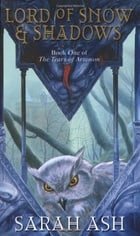 Posted : 15 years, 4 months ago on 19 January 2010 11:07
(A review of Lord of Snow and Shadows [Book One of The Tears of Artamon].)
Posted : 15 years, 4 months ago on 19 January 2010 11:07
(A review of Lord of Snow and Shadows [Book One of The Tears of Artamon].)This is the first volume of The Tears of Artamon (before Prisoner of the Ironsea Tower, and Children of the Serpent Gate).
Lord of Snow and Shadows tells the story of Gavril, a young painter who is suddenly snatched from his quiet life in sun-bathed Smarna after the father he's never met is murdered, and forcibly taken to the snow-bound kingdom of Azhkendir, where he's expected to avenge and succeed him.
Moreover, he soon learns that his heirloom comes with yet another price: the blood that runs in his family's veins is slowly transforming him into a Drakhaoul, a beast of incredible might but needing to be refuelled with the blood of young innocents. Gavril must absolutely resist it to preserve his soul and not give in to this dreadful craving.
In the meantime, his mother Elysia searches for him, imploring the help of the neighbouring Muscobite aristocracy, only to find herself caught in the middle of a powerplay between people lying in wait of a sign of weakness from the North to attack her son. She'll end up trusting the wrong people, who'll use her to invade Azhkendir.
I was taken in by the story from the very first pages and soon lost myself in the account of these intricate events, trying to see through these complex characters. The book is no light and happy fairy tale, though and some passages are terribly grim. However, Gavril's helplessness and good-heartedness make him very lovable, and I became very fond of Kiukiu, the cook's young niece and other maids' bully target, who'll discover powers of her own and finally befriend the Kastel's other desolate soul... I also enjoyed Sarah Ash's descriptions of winter in Azhkendir, so true to life I could feel the harshness of the cold. I'm eager to go on reading and see how the very tricky situation everyone is entangled in evolves.
Lord of Snow and Shadows tells the story of Gavril, a young painter who is suddenly snatched from his quiet life in sun-bathed Smarna after the father he's never met is murdered, and forcibly taken to the snow-bound kingdom of Azhkendir, where he's expected to avenge and succeed him.
Moreover, he soon learns that his heirloom comes with yet another price: the blood that runs in his family's veins is slowly transforming him into a Drakhaoul, a beast of incredible might but needing to be refuelled with the blood of young innocents. Gavril must absolutely resist it to preserve his soul and not give in to this dreadful craving.
In the meantime, his mother Elysia searches for him, imploring the help of the neighbouring Muscobite aristocracy, only to find herself caught in the middle of a powerplay between people lying in wait of a sign of weakness from the North to attack her son. She'll end up trusting the wrong people, who'll use her to invade Azhkendir.
I was taken in by the story from the very first pages and soon lost myself in the account of these intricate events, trying to see through these complex characters. The book is no light and happy fairy tale, though and some passages are terribly grim. However, Gavril's helplessness and good-heartedness make him very lovable, and I became very fond of Kiukiu, the cook's young niece and other maids' bully target, who'll discover powers of her own and finally befriend the Kastel's other desolate soul... I also enjoyed Sarah Ash's descriptions of winter in Azhkendir, so true to life I could feel the harshness of the cold. I'm eager to go on reading and see how the very tricky situation everyone is entangled in evolves.
 0 comments, Reply to this entry
0 comments, Reply to this entry
Nostalgia, dreams and hopes.
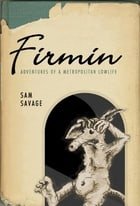 Posted : 15 years, 6 months ago on 4 December 2009 10:54
(A review of Firmin: Adventures of a Metropolitan Lowlife)
Posted : 15 years, 6 months ago on 4 December 2009 10:54
(A review of Firmin: Adventures of a Metropolitan Lowlife)Boston, the 60s. The rat Firmin's life begins in the basement of a old bookshop, the runt of litter of 13. Rejected by his family, he has no choice but to feed on the pages he tears out of books, until he discovers he actually understands the words written on them and starts devouring them, figuratively, instead.
Exploring the neighbourhood, he discovers Scollay Square and the Rialto theatre, meeting Fred Astaire & Ginger Rogers on the screen, and the Lovelies after midnight. Back home he observes Norman Shine, the shopkeeper, from a hole in the ceiling. Every morning they read the newspaper together – and find out that the area is going to be demolished and renovated soon, sounding the death knell for the Pembroke Books. It isn't long until Firmin tries to communicate with Norman, only to be served rat poison in return.
Discomfited, his love unrequited, Firmin learns some sign language and tries his luck at the Public Garden... without much success either, and is rescued by Jerry Magoon, the solitary sci-fi writer who lives next to the shop. Together they listen to music and eat peanut butter. But Firmin's hopes are dashed again when he realizes his friend doesn't actually understand him and only sees him as a funny pet.
Firmin is a moving, sometimes sad, novel full of nostalgia, impossible dreams and foolish hopes. I really wish I could have been Firmin's friend.
Exploring the neighbourhood, he discovers Scollay Square and the Rialto theatre, meeting Fred Astaire & Ginger Rogers on the screen, and the Lovelies after midnight. Back home he observes Norman Shine, the shopkeeper, from a hole in the ceiling. Every morning they read the newspaper together – and find out that the area is going to be demolished and renovated soon, sounding the death knell for the Pembroke Books. It isn't long until Firmin tries to communicate with Norman, only to be served rat poison in return.
Discomfited, his love unrequited, Firmin learns some sign language and tries his luck at the Public Garden... without much success either, and is rescued by Jerry Magoon, the solitary sci-fi writer who lives next to the shop. Together they listen to music and eat peanut butter. But Firmin's hopes are dashed again when he realizes his friend doesn't actually understand him and only sees him as a funny pet.
Firmin is a moving, sometimes sad, novel full of nostalgia, impossible dreams and foolish hopes. I really wish I could have been Firmin's friend.
 0 comments, Reply to this entry
0 comments, Reply to this entry
Not as good as I remembered it.
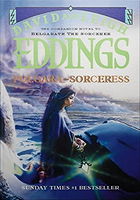 Posted : 15 years, 6 months ago on 25 November 2009 10:25
(A review of Polgara the Sorceress (Malloreon))
Posted : 15 years, 6 months ago on 25 November 2009 10:25
(A review of Polgara the Sorceress (Malloreon))This is the second prequel to the Belgariad and Malloreon (after Belgarath the sorcerer).
This volume, as the title implies, tells us Polgara's side of the story, from her childhood in the Vale, growing up with her twin sister Beldaran, spending time in her tree, to the guarding of the Rivan line and her moving to Faldor's farm with Garion.
She tells us about the pain of the separation from her sister when the latter leaves to marry Riva, about her learning medicine when Beldaran becomes pregnant, and about the devastating loss when her sibling finally passes away.
Then follows an account of the time she spent in Asturia as the Duchess of Erat, trying to reunite the belligerent Wacites, Arends and Mimbrates into a semblance of peace, and of the war that finally breaks out, killing several close friends. Polgara then retires to her estate near Lake Sulturn and later creates Sendaria.
Polgara manages to save the Rivan line when she rescues young Geran, the only remaining heir after an terrible attack on the Isle of the Winds. From then on her task will be to protect these little boys from Torak and his minions, and to secure the progeny until the Godslayer is born.
All in all, this volume wasn't as good as I remembered it, although I'm sure I enjoyed some chapters, such as Polgara's time in Asturia, more than the first time. The favourite passages I was looking forward to weren't actually that poignant, and I found her tone and haughty petulance rather irritating in the long run. Not to mention the awfully long months it took me to read it again, which seem now a bit like a loss of time.
This volume, as the title implies, tells us Polgara's side of the story, from her childhood in the Vale, growing up with her twin sister Beldaran, spending time in her tree, to the guarding of the Rivan line and her moving to Faldor's farm with Garion.
She tells us about the pain of the separation from her sister when the latter leaves to marry Riva, about her learning medicine when Beldaran becomes pregnant, and about the devastating loss when her sibling finally passes away.
Then follows an account of the time she spent in Asturia as the Duchess of Erat, trying to reunite the belligerent Wacites, Arends and Mimbrates into a semblance of peace, and of the war that finally breaks out, killing several close friends. Polgara then retires to her estate near Lake Sulturn and later creates Sendaria.
Polgara manages to save the Rivan line when she rescues young Geran, the only remaining heir after an terrible attack on the Isle of the Winds. From then on her task will be to protect these little boys from Torak and his minions, and to secure the progeny until the Godslayer is born.
All in all, this volume wasn't as good as I remembered it, although I'm sure I enjoyed some chapters, such as Polgara's time in Asturia, more than the first time. The favourite passages I was looking forward to weren't actually that poignant, and I found her tone and haughty petulance rather irritating in the long run. Not to mention the awfully long months it took me to read it again, which seem now a bit like a loss of time.
 0 comments, Reply to this entry
0 comments, Reply to this entry
 Login
Login
 Home
Home 7 Lists
7 Lists 198 Reviews
198 Reviews Collections
Collections